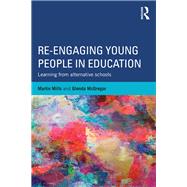- ISBN: 9780415505055 | 0415505054
- Cover: Nonspecific Binding
- Copyright: 10/18/2013
This book provides insights into the educational practices that work to re-engage young people who have become disenchanted with traditional schooling practices. It examines the lives of students and workers (such as teachers and social workers) who participate in education sites on the fringes of mainstream education. Found within such fringes are students who have the resources to pay for an alternative education and students who are marginalised by poverty and other difficult life circumstances or because of their personality and/or personal philosophies. Regardless of the reasons that lie behind youthful disengagement from schooling, the responsibility still rests with the adult educational establishment to create ways of re-engaging them and providing these young people with an education that is rightfully theirs. This book not only provides insights into alternative schools but it also has implications for mainstream schooling. The data indicate that many of the students who have disengaged from mainstream schooling do re-engage in the learning process in many of these alternative schools, with some moving into university and post-schooling vocational courses. Clearly, the teaching practices that work in alternative sites provide models of instruction that may be usefully employed in mainstream schools- perhaps to prevent disengagement and alienation in the first place. Based on research in the UK and Australia, but of relevance to schooling systems internationally where there is growing interest in alternative schooling models as responses to access and equity, the book provides salutatory lessons for policy regimes designed to increase the retention levels of young people in schooling in a range of locations. The data presented indicate that improving the retention levels of young people in formal education will require many schooling practices to change. These schooling practices include moves towards full service schooling, greater flexibility for students in terms of attendance and a re-envisioning of teacher/student relationships and the kinds of pedagogy made possible by more democratic modes of schooling.






